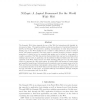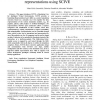55 search results - page 3 / 11 » Why Use a Unified Knowledge Representation |
EMNLP
2008
13 years 6 months ago
2008
To improve the Mandarin large vocabulary continuous speech recognition (LVCSR), a unified framework based approach is introduced to exploit multi-level linguistic knowledge. In th...
APIN
2002
13 years 5 months ago
2002
We develop the scheme of indefinite constraint databases using first-order logic as our representation language. When this scheme is instantiated with temporal constraints, the res...
CORR
2007
Springer
13 years 5 months ago
2007
Springer
The Semantic Web drives towards the use of the Web for interacting with logically interconnected data. Through knowledge models such as Resource Description Framework (RDF), the S...
ADBIS
2000
Springer
13 years 8 months ago
2000
Springer
In this paper we describe an approach to representation of data and knowledge using two technologies: XML and regular expressions in a domain of natural language syntactic analysis...
IJVR
2006
13 years 5 months ago
2006
This paper introduces SCIVE, a Simulation Core for Intelligent Virtual Environments. SCIVE provides a Knowledge Representation Layer (KRL) as a central organizing struc...


